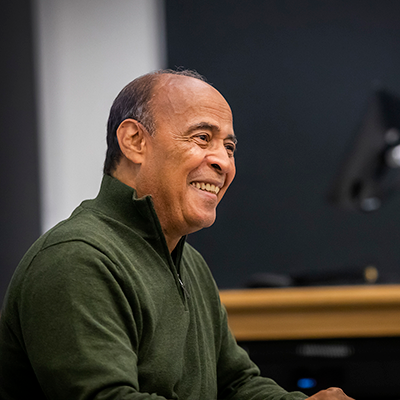Image

Kwame Anthony Appiah

How do our identities shape what we value—in ourselves, and others? How does what we legislate and create reflect our ideals as a society? A renowned ethicist and professor of philosophy and law at NYU, Kwame Anthony Appiah is known for his innovative work in the field of cultural differences and political philosophy. Raised in Ghana and educated at the University of Cambridge, Kwame has witnessed a broad spectrum of the social, economic, and political forces that shape ethics in this age of international exchange. What do we tell ourselves about who we are—and who others are? How can we shed harmful patterns of identity politics and groupthink, to access growth that’s good for everyone?
His new and acclaimed book, The Lies That Bind: Rethinking Identity, explores the nature and history of our identities (including gender, religion, race, and nationality) and how each defines us. Much like in his weekly column for The New York Times Magazine, “The Ethicist,” Kwame’s talks are brilliant and informed, and offer much-needed guidance on how to bridge political divides. He takes an in-depth approach to exploring our identities and what they mean in a contemporary context: and how we can challenge our inherited assumptions and adapt to changing values through progressive, open dialogue.
Image

Adolph Reed Jr.

Adolph Reed Jr. is Professor Emeritus of Political Science at the University of Pennsylvania. He has taught at Howard, Yale, and Northwestern Universities, the University of Illinois at Chicago, and the New School for Social Research.
He has been a Carnegie Corporation Scholar of Vision (2002/3), John J. McCloy ’16 Visiting Professor at Amherst College (1998/99) and the inaugural Scholar in Residence, McKenna Center for Leadership, St. Francis Xavier University, November 11–19, 2019.
He was Featured International Speaker, at the invitation of the Minister of the Secretariat, at the national symposium, broadcast live on Brazilian national television, marking the tenth anniversary of the Brazilian Presidential Secretariat for the Promotion of Racial Equality, 2013 and was Keynote speaker at Fourth Annual Labor Fest Hawaii conference, Honolulu, HI, 2015.
He is the editor of Race, Politics and Culture: Critical Essays on the Radicalism of the 1960s (Greenwood Press, 1986) and Without Justice for All: The New Liberalism and our Retreat from Racial Equality (Westview, 1999) and with Kenneth W. Warren of Renewing Black Intellectual History: The Ideological and Material Foundations of African American Thought (Paradigm, 2010). He is author of The Jesse Jackson Phenomenon: The Crisis of Purpose in Afro-American Politics (Yale Press, 1986); W.E.B. Du Bois and American Political Thought: Fabianism & the Color Line (Oxford University Press, 1997) Stirrings in the Jug: Black American Politics in the Post-Segregation Era (University of Minnesota Press, 1999), Class Notes ( New Press, 2000), a collection of his popular political writing). He is currently completing two books—“You Can’t Get There from Here” a critique of black cultural studies with Kenneth Warren (Routledge) and “When Compromises Come Home to Roost: The Decline and Transformation of the U. S. Left” (Verso). His rumination on the Jim Crow order—The South: Jim Crow and its Afterlives (Verso)—will be available in early 2022.
He has been a columnist in The Progressive, The Village Voice, and The New Republic and has written frequently in The Nation, Dissent, nonsite.org, of which he is an editorial board member, and many other academic and popular journals and magazines. He served on the board of Public Citizen, Inc. and was a member of the Interim National Council of the Labor Party, and the executive committee of the American Association of University Professors, and he is currently on the boards of Food and Water Action and the Debs-Jones-Douglass Institute (DJDI) and is an Organizer in the DJDI’s Medicare for All-South Carolina campaign.